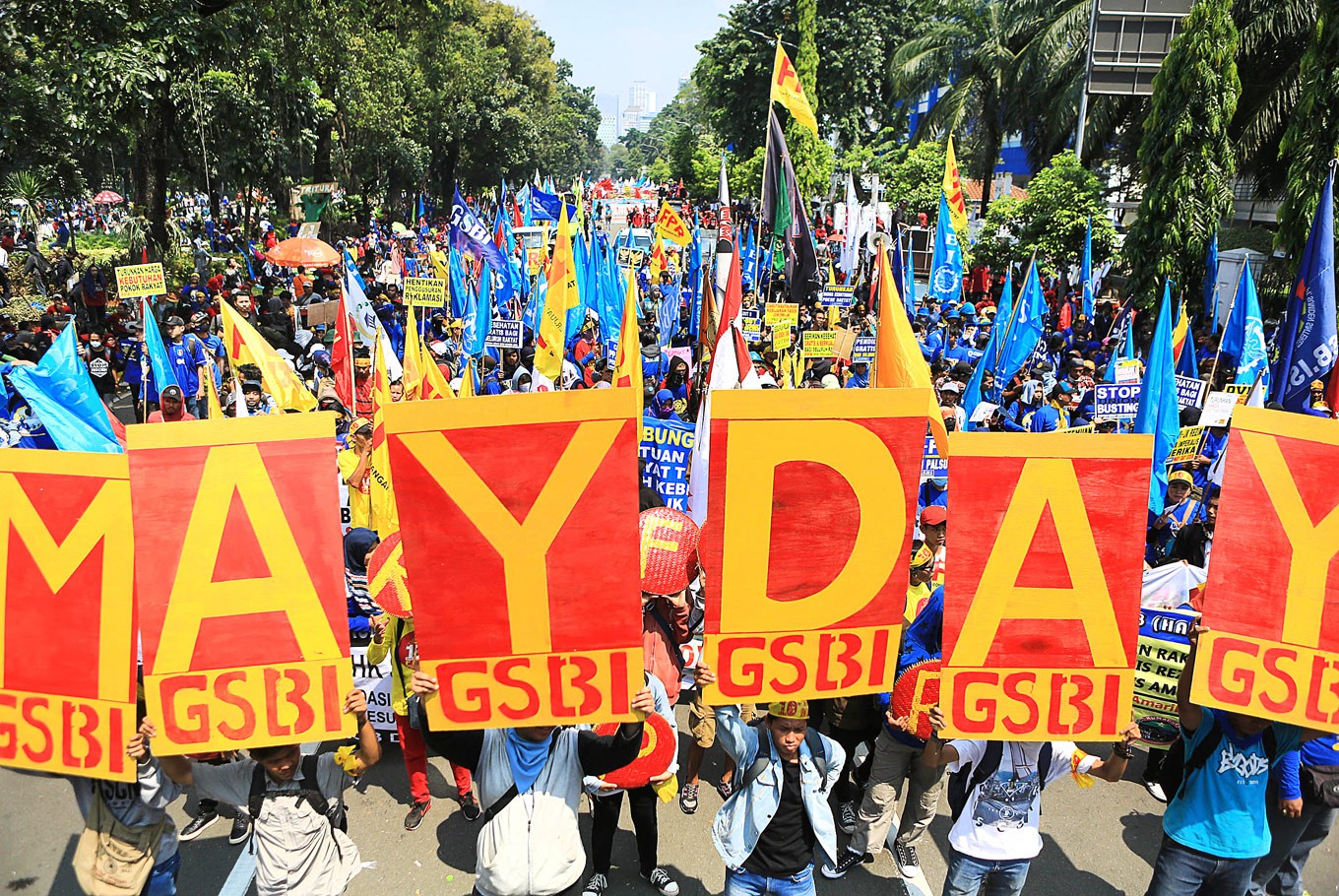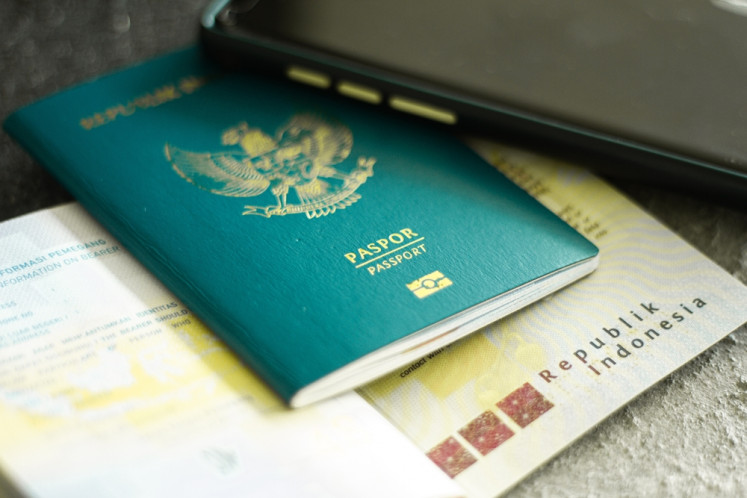Labor Party 4.0? Indonesian workers revive old political vehicle
The revival of the Labor Party marks another shift in Indonesian labor politics.
Change Size

O
n Oct. 5, 2020, millions of Indonesian workers suffered their worst defeat since the Reform Era with the enactment of the omnibus Job Creation Law.
The legislation was a blow to trade unions. It contains provisions that they say roll back the policy achievements they had gained throughout the years, mainly through street politics and electoral bargaining with politicos at the local and national levels.
The passage of the law, writes political scientist Teri Caraway of the University of Minnesota, “was a resounding defeat for labor unions and marked the culmination of a multi-year effort to clip labor’s wings.”
Defeated and disillusioned, the labor unions have now come to the realization that they can no longer rely on the existing political parties — not one of them could be formally classified as a party of the working class — to further their interests.
On Tuesday, exactly one year after the enactment of the omnibus law, they declared the revival of the Labor Party and their intention to take part the 2024 general elections.
“The jobs law is what triggered the revival of the Labor Party. We want to fight in the legislature, and not just on the streets,” said Said Iqbal, the president of the Confederation of Indonesian Trade Unions (KSPI), shortly after being elected the new chairman of the party on Tuesday.
The rise and fall of labor politics
The revival of the Labor Party marks another shift in Indonesian labor politics. For more than a decade, workers had relied on forging alliances and electoral bargaining with major political parties and presidential candidates to achieve their goals.
Said himself is no stranger in practical politics. In 2014, the KSPI, under his leadership, made a political deal with then presidential candidate Prabowo Subianto that it would support him on the ballot in return for a ministerial position in his future Cabinet.
The unions had run in elections before, but failed to make any considerable gains. Four labor-based parties joined the first democratic election after Soeharto’s downfall in 1999: the National Labor Party (PBN), the Labor Solidarity Party (PSB), the Indonesian Workers Party (PPI) and the All-Indonesia Labour Solidarity Party(SPSI). None of them passed the electoral threshold to either enter the House of Representatives or take part in the next elections.
Mochtar Pakpahan, founder of the PBN, changed his party’s name into the Social Democratic Labor Party (PBSD) as required by the law in order to compete in the 2004 elections. It only garnered a meager 0.56 percent of the vote, forcing the party to change its name again to take part in its last election in 2009 as the Labor Party.
Despite a string of electoral defeats, the labor unions with their mobilizational powers had been relatively successful in their fight outside the legislature. In 2003, workers managed to secure a major victory with the passing the 2003 Manpower Law, which contains some of the strongest pro-labor provisions in the region, including the high severance pay that businesses say is too prohibitive for investors.
The Susilo Bambang Yudhoyono administration made several attempts to revise the law but to no avail in the face of massive street rallies by the workers that paralyzed the capital. The strategy, however, was no longer effective when the Joko “Jokowi” Widodo administration pushed for the passage of the jobs law last year.
Creating a welfare state
The new Labor Party is backed by more than 50 unions and federations, Said said, expressing his confidence that the workers are now united to fight for their cause inside the legislature. Its revival was initiated by the four largest labor unions—the KSPI, the All Indonesia Labor Union (SPSI), the Indonesia Welfare Labor Confederation (KSBSI) and All Indonesia United Workers Confederation (KPBI).
“We hope the party can pass the verification by the KPU [General Elections Commission] and the legislative threshold. That is more than enough for the initial stage of reviving the Labor Party," he said. "In 10 years the Labor Party will be inside the circle of power with the aim [of building] a welfare state," Said said on Tuesday.
According to the 2008 Political Parties Law, a party must be legally registered, have at least 50 adults of Indonesian nationality as members, 30 percent of whom should be women. The 2017 General Elections Law, meanwhile, stipulates a party should have a minimum of 1,000 members, local representatives in each province, with at least 75 percent in regencies or cities, and 50 percent in subdistricts.
Said said that with the support of four trade confederations, 50 trade unions and also millions of farmers, fishermen and contract teachers, he was upbeat the party could get at least 100,000 active members on board. Each member, he said, would be asked to pay a fee of Rp 50,000 (about US$4) to finance the party’s operations.
Party of the working class
Arianto Sangadji, the director of the IndoProgress Institute for Social Research and Education (IISRE), welcomed the revival of the Labor Party, saying that the Indonesian working class did not have a political vehicle to fight for their interests in the legislature and they could no longer rely solely on the mobilizational power of the trade unions.
"Even though the Indonesian Democratic Party of Struggle [PDI-P] is known as the party of the people, it's all just political rhetoric to gain votes in elections,” he said. “Is it a party that fights for labor interests? I don't think so.”
The absence of the left from Indonesian politics following the 1965 communist purge, which saw the killing of an estimated 500,000 Indonesians linked to the Indonesian Communist Party (PKI), is partly to blame for the poor showing of labor parties in elections.
In 1955, the PKI came fourth in the election with 16 percent of the vote. The Labor Party gained only 0.59 percent of the vote but it managed to secure a ministerial seat for its member, SK Trimurti, then chairwoman of the Women’s Labor Front (BBW).
Arianto said he too was optimistic that the new Labor Party would have the chance of taking part in the 2024 elections given the big support it has gained from various trade unions. “They have real power. I think they can get something in the 2024 election, at least their representatives can sit in the legislature.” (ahw)









